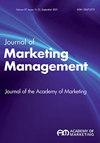When parasocial relationships turn sour: social media influencers, eroded and exploitative intimacies, and anti-fan communities
IF 3
3区 管理学
Q2 BUSINESS
引用次数: 0
Abstract
ABSTRACT Whilst social media influencers (SMIs) excel at establishing positive parasocial relationships with their followers, they can also provoke intense negative responses, as evidenced by the prevalence of SMI-focused anti-fan communities. Prior research does not explain how consumers’ parasocial relationships with SMIs become negatively charged, nor does it explain why this shift may fuel anti-fan community participation. Drawing from a netnographic study of two SMI anti-fan communities, we reveal that eroded reciprocal and disclosive intimacies, as well as exploitative commercial intimacies, can lead consumers’ positive parasocial relationships with SMIs to become negatively charged. We demonstrate that anti-fan communities provide opportunities for consumers reluctant to sever ties with the SMI to sustain their negative parasocial relationship by rebuilding eroded intimacies whilst avoiding and/or retaliating against their exploitation.当反社会关系恶化时:社交媒体影响者、被侵蚀和剥削的亲密关系以及反粉丝社区
虽然社交媒体网红(smi)擅长与粉丝建立积极的副社会关系,但他们也会引发强烈的负面反应,以smi为中心的反粉丝社区的盛行证明了这一点。先前的研究并没有解释消费者与smi的副社会关系是如何变得消极的,也没有解释为什么这种转变可能会助长反粉丝社区的参与。通过对两个SMI反粉丝社区的网络研究,我们发现,被侵蚀的互惠和公开的亲密关系,以及被剥削的商业亲密关系,可能导致消费者与SMI的积极副社会关系变得带负电荷。我们证明,反粉丝社区为不愿与重度精神分裂症患者断绝关系的消费者提供了机会,通过重建被侵蚀的亲密关系,同时避免和/或报复他们的剥削,来维持他们的负面副社会关系。
本文章由计算机程序翻译,如有差异,请以英文原文为准。
求助全文
约1分钟内获得全文
求助全文

 求助内容:
求助内容: 应助结果提醒方式:
应助结果提醒方式:


